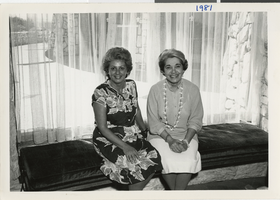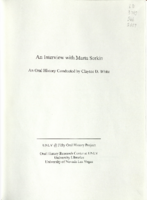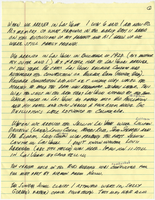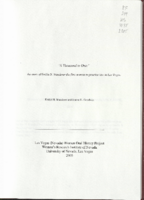Search the Special Collections and Archives Portal
Search Results
Marian Wojciechowski oral history interview
Identifier
Abstract
Oral history interview with Marian Wojciechowski conducted by Claytee D. White on June 16, 2009 for The Boyer Las Vegas Early History Project. Wojciechowski discusses being born in Poland at the beginning of World War I, participating in the Polish underground resistance movement at the beginning of World War II, and being sent to Auschwitz. He also talks about a woman who rescued 2,500 Jewish children during World War II.
Archival Collection

Photographs and profile of Art Lurie, 1980s
Date
Archival Collection
Description
Various photographs and profile of Art Lurie.
Mixed Content

Photo album, various pictures and correspondence from Dorothy Eisenberg, 1981-1995 and undated
Date
Archival Collection
Description
Group of photographs and ephemera of Dorothy Eisenberg and various politicians and local officials.
Image

Transcript of interview with Marta Sorkin by Claytee White, March 2, 2009
Date
Archival Collection
Description
In this interview, conducted for the 50th anniversary of UNLV, Marta Sorkin discusses her family and her experience moving to California, and then to Las Vegas. Sorkin worked at the James R. Dickinson Library at UNLV and later in Lied Library, helping to implement and update various databases, and create displays on current topics. She briefly discusses her involvement with Hillel and the Jewish Federation of Las Vegas.
Marta Sorkin begins by reminiscing about her childhood in Far Rockaway Long Island, New York. She details the life her parents lived, which set an example for Marta and her two siblings. Through hard work, advanced education, and involvement in causes that were important to them, they created the template by which Marta lives her life. Marta describes her early work history, which included modeling, sales, library work, and working part time in her father's dry-cleaning plant. She and her daughter were living with her parents for a time in California, and they visited Las Vegas on weekends. It was during one of those visits that Marta met her second husband-to-be. They eventually married and decided to settle in Las Vegas. In Las Vegas, Marta enrolled at UNLV, became involved with the Preservation Association of Clark County, and volunteered at the Jewish Federation of Las Vegas. In addition, she completed her BA and MA degrees at UNLV and started working at the university's library. She details her work there, including creating display cases, working in the reference section, doing research for students and faculty, and compiling interviews. Marta also describes the fundraisers she spearheaded to help raise money for the various societies she was involved with: non-events, pancake breakfasts, dinners, and dance and band performances. In her closing comments she mentions an interview she did for Ralph Roske's class and expresses her appreciation for the career she's had at UNLV.
Text

Essay, by Charles Salton (1921-2004), 2002
Date
Archival Collection
Description
Handwritten essay by Adele Baratz?s brother, Charles Salton, in 2002 describing his family history since coming to Las Vegas in 1928, and the history of the Jewish community in the area.
Text

Transcript of interview with Emilie Wanderer by Joanne Goodwin, 2000
Date
Archival Collection
Description
Emilie Wanderer was the first woman to establish a law practice in Las Vegas. She also helped to start a family court in Nevada with a social worker and a marriage counselor on staff. She and her son John were the first mother-son team to practice law in Nevada.
Text
Linda Rivera oral history interview
Identifier
Abstract
Oral history interview with Linda Rivera conducted by Layne Karafantis on October 02, 2009 for the Women's Research Institute of Nevada (WRIN) Las Vegas Women Oral History Project. Rivera opens her interview by discussing her youth as a Latina in Arizona in the 1960s. Rivera then talks about schooling conditions and discrimination. She describes her first job at the Solomon Bill School District and, while there were many Hispanic students, there were not many Hispanic teachers or student leaders. Rivera then describes moving to Nevada in 1986 and searching for Hispanic culture in Las Vegas, Nevada. Rivera discusses the formation of the Hispanic Roundtable, an organization that develops Hispanic leadership in Nevada. She also talks her work to make the Clark County School District more accessible to working families and her awards and recognition within the Latinx community.
Archival Collection
Other community involvement records and personal papers, 1940s-2015
Level of Description
Scope and Contents
The "Other community involvement records and personal papers" series mainly consists of materials created and collected by Miriam "Mimi" Katz from the 1940s to 2015 that document her involvement in the Las Vegas, Nevada community. This series contains a substantial amount of political campaign materials documenting Katz's volunteer work for state and federal candidates such as John Kerry, Dina Titus, Bill Clinton, and Al Gore. Katz was involved in the League of Women Voters and Temple Beth Sholom's Meet the Candidates nights, which is reflected in records and planning documents in this series. Records of other special events that Katz helped to plan for Temple Beth Sholom and its Active Adults program, as well as the Jewish Community Center of Southern Nevada, are also included in this series. The history of the local Jewish community is described in compositions by George Katz and Jerome D. Countess. Finally, this series includes some personal items documenting Katz's life, including photographs, certificates of recognition, and her obituary and memorial service program.
Archival Collection
Collection Name: Miriam "Mimi" Katz Papers
Box/Folder: Box 02-03
Archival Component
T-Shirt Color: Navy Blue; Front: Santa Fe County Fire & EMS, Fire Dept. Emblem W/ Fire Equipment & Medical Symbol; Back: Santa Fe County Fire Dept.; Handwritten Text: Various Names & Statements: Isaac Parks, God Bless, May God Bring You Blessing, Dave Roberts, Casey McFarland; Edgewood & Santa Fe Co. Fire, Dept. Proudly Recognizes All The Brave Men & Women Of 9-11 Our Hearts & Prayers Are With Them, approximately 2001-2012
Level of Description
Archival Collection
Collection Name: New York-New York Hotel and Casino 9-11 Heroes Tribute Collection
Box/Folder: Box 388
Archival Component
Renee Diamond Papers
Identifier
Abstract
The Renee Diamond Papers date from 1972 to 2000 and consist primarily of political and professional materials including reports, correspondence, publications, newsletters, and planning documents collected by Diamond throughout her career. Diamond supported the feminist movement as a member of the National Organization for Women and held leadership roles in the Democratic party in Las Vegas, Nevada. The collection also documents Diamond’s campaigns for the Nevada State Assembly and includes material from her one term in the legislature.
Archival Collection
